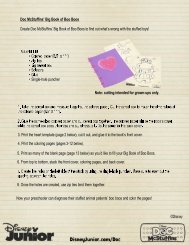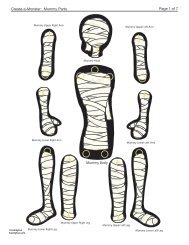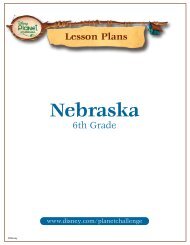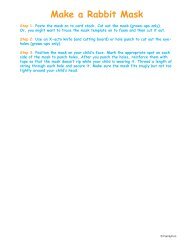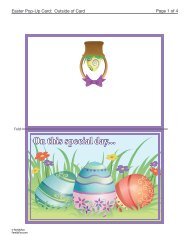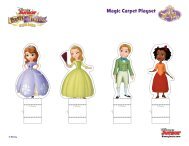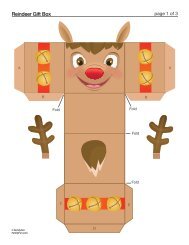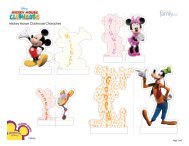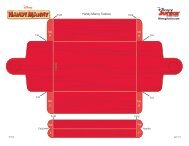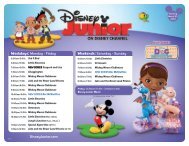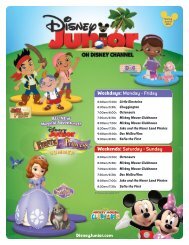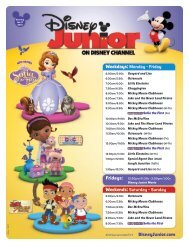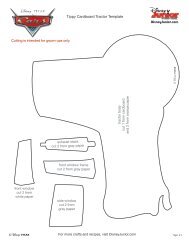Create successful ePaper yourself
Turn your PDF publications into a flip-book with our unique Google optimized e-Paper software.
This guide was created by Tracie Vaughn Zimmer, a reading specialist and author<br />
of Reaching for Sun.Visit her Web site at www.tracievaughnzimmer.com<br />
to find many other book club guides.<br />
<strong>The</strong> <strong>Hoopster</strong><br />
Tr. ed. 0-7868-5483-9<br />
ISBN-13: 978-0-7868-5483-7<br />
224 pages • $16.99<br />
Pbk. ed. 0-7868-4910-X<br />
ISBN-13: 978-0-7868-4910-9<br />
$5.99<br />
<strong>The</strong> <strong>Hoopster</strong> <strong>Trilogy</strong><br />
Hip-Hop High School<br />
Tr. ed. 0-7868-5515-0<br />
ISBN-13: 978-0-7868-5515-5<br />
384 pages • $16.99<br />
Pbk. ed. 1-4231-0644-X<br />
ISBN-13: 978-1-4231-0644-9<br />
$8.99<br />
Jump at the Sun<br />
An imprint of Hyperion Books for Children /Disney Book Group<br />
114 Fifth Avenue, New York, NY 10011-5690<br />
www.jumpatthesun.com<br />
Also visit: www.thehoopsterbook.com<br />
Homeboyz<br />
Tr. ed. 1-4231-0030-1<br />
ISBN-13: 978-1-4231-0030-0<br />
288 pages • $16.99<br />
Pbk. ed. 1-4231-0031-X<br />
ISBN-13: 978-1-4231-0031-7<br />
$8.99<br />
(Due Fall 2008)<br />
THE<br />
HOOPSTER<br />
TRILOGY<br />
DISCUSSION GUIDE<br />
JUMP AT THE SUN
THE HOOPSTER<br />
Andre Anderson has got it all together: work, play, and romance. As “the <strong>Hoopster</strong>,” he<br />
rules the local pickup basketball court. His new girlfriend, Gwen, is as smart, good-looking,<br />
and ambitious as he is. And at Affairs magazine, where Andre works as a summer intern, his<br />
featured personal essay on racism has just made him a local celebrity. As his boss says,<br />
Andre’s destiny awaits him—he just has to claim it. But the unflinching honesty of Andre’s<br />
writing soon makes him the target of hateful racism, and triumph turns to tragedy when<br />
Andre is violently assaulted by a vicious gang.When Andre withdraws into depression and<br />
unreachable silence, his family and friends fear he may never recover.<br />
DISCUSSION QUESTIONS<br />
1 How is the friendship between Shawn, Andre, and Cedric introduced? Is this an accurate<br />
portrayal of young men’s friendships? How so? How do young men build friendships? Do<br />
you think it is a different process for young women? Why or why not?<br />
2 Describe Shawn’s and Andre’s interests. How do they both critique and encourage each<br />
other? Where do they both work? If you had to choose one of their jobs, which position<br />
would you select? Why?<br />
3 Explain how Andre gets a chance to write a feature article for Affairs magazine.Why does<br />
he turn it down at first? What advice does Mr. Jarvin offer him?<br />
4 Describe how Shawn and Andre behave at each other’s house. Is there anywhere that you<br />
feel is a second home to you? What makes it this way? How did it develop over time?<br />
5 What does Andre mean when he tells Cedric that his answer is an “Uncle Tom answer<br />
and you know it”? Why does he feel his cousin has sold out? Why doesn’t he think his<br />
cousin is funny? Would you? Have you ever felt betrayed in a similar way? How? What<br />
happens between Andre and Cedric the following day on the basketball court? With<br />
whom do you agree? Why?<br />
6 What story does Pops share with Andre after his fight with Cedric? How and when does<br />
Pops become a victim? Do you agree? Are Cedric and Andre able to bury the hatchet?<br />
How? Do you think men are better at resolving disagreements?<br />
7 How does Gwen and Andre’s date on the Fourth of July turn out? Why does it change so<br />
abruptly? Can you see both sides of the argument? Who in the scene displays the worst<br />
behavior? Why?<br />
8 What is Mr. Jarvin’s reaction to Andre’s article? How is it received by the public? What<br />
happens that serves as a foreshadowing of the fact that all may not be perfect with this<br />
public demonstration of his beliefs? Do you think Mr. Jarvin should have warned Andre?<br />
Do you think it would have made a difference?
9 Describe how Andre is attacked in the parking garage.What reason do the attackers give<br />
for their assault? How does it mirror Pop’s story from college? Is Andre able to heal<br />
from it both physically and emotionally? Do you think he will continue writing? How<br />
do you know?<br />
10 How do Cedric and Shawn react to the violence inflicted on Andre? Is it fair for Shawn—<br />
who acknowledges that he cannot understand “what it is like to be a black man in this<br />
country,”—to call Cedric on his plan for revenge? In the end, what does Cedric decide<br />
to do? Why is he still conflicted about his choice? Who do you think is the bravest?<br />
PROJECTS<br />
Write your own lead article about race relations in your community. How have things<br />
changed since your parents were young? How could race relationships improve, and what<br />
do you think would make the biggest difference in those relationships?<br />
Write an action scene inspired by the basketball scenes in <strong>The</strong> <strong>Hoopster</strong>. How does Sitomer<br />
use both action and dialogue to advance the momentum of the scene?<br />
HIP-HOP HIGH SCHOOL<br />
<strong>The</strong>resa Anderson (Tee-Ay) is smarter than anyone knows. But with the example of her superachiever<br />
older brother, Andre, towering above her, she hasn’t even been trying. How can a girl<br />
compete against the family favorite, especially when he’s a certified local hero? With parents<br />
and teachers always on her case, and her best friend pregnant and a dropout,<strong>The</strong>resa turns<br />
to hip-hop for comfort. Her favorite singers seem to understand her when no one else does.<br />
Everything changes when a new man comes into <strong>The</strong>resa’s life: Devon, whose tough-guy<br />
reputation conceals a blazing ambition for academic success. Devon helps <strong>The</strong>resa face up to<br />
her own talent and ambition, and together they set off on a three-year quest to beat the SAT
and get into top colleges. But then Devon gets shot in a street fight, leaving <strong>The</strong>resa with<br />
two piles of unfinished college applications—her own and Dev’s—and time running out. . . .<br />
In this funny and inspiring sequel to <strong>The</strong> <strong>Hoopster</strong>, Andre Anderson’s sister <strong>The</strong>resa tells the<br />
story in her own hip-hop-flava’d voice of how she came from behind to go up against one of<br />
the baddest monsters of high school—the SAT—and won.<br />
DISCUSSION QUESTIONS<br />
1 Describe the setting for Hip-Hop High School. Compare it to your own school experience.<br />
What things are similar and what things are different? How important is the setting to<br />
this story? How are the characters affected by the world they try to navigate?<br />
2 Explain how things get started for Tee-Ay in the new school year.What classes does she<br />
have? Is she a good student? What choices does she make about school?<br />
3 Who are Tee-Ay’s best friends? Create a Venn diagram to compare their similarities and<br />
differences.Who do you think is the better influence on <strong>The</strong>resa? What does Tee-Ay<br />
realize about herself through these friendships?<br />
4 Why doesn’t Tee-Ay get along with her mother? Do you think her mom is especially<br />
hard on <strong>The</strong>resa or is she only looking out for <strong>The</strong>resa’s best interests? Does <strong>The</strong>resa get<br />
blamed unfairly for things she didn’t do? Do you think that in every family someone has<br />
it easier than the other members? Why or why not?<br />
5 Who is Tee-Ay’s brother? Why is it difficult for <strong>The</strong>resa to live in the shadow of his success?<br />
Do you think it would be more difficult to come after a sibling who was especially<br />
successful or one who was exceptionally troubled? How do we define ourselves outside<br />
of our families?<br />
6 Cee-Saw gets Tee-Ay to attend the “party of the century.” How does Tee-Ay escape her<br />
punishment? Explain what happens at the party and the consequences that follow. How<br />
does it haunt Tee-Ay at home and at school? Would you be mad that your friend faced no<br />
consequences while your punishment was severe?<br />
7 What book really changes Tee-Ay’s perspective? What book has most influenced your<br />
own thinking? Why? Have you had any luck persuading any of your friends to read it?<br />
Does Tee-Ay have any luck getting her friends to read <strong>The</strong> Autobiography of Malcolm X?<br />
Why? Do you believe that a movie or other form of media can influence a person the<br />
same way that a book can? Why or why not?<br />
8 Compare the choices that Tee-Ay makes to those of her friends—Cee-Saw, Sonia, and<br />
Jax.Which decisions end up being the most important? How close is Tee-Ay from the<br />
same fate? Are some decisions simply more important than others? How do you know<br />
which ones are the most important? How do you make important choices?<br />
9 How does Devon’s friendship change <strong>The</strong>resa? What does she learn from him about the<br />
SAT and life in general? Over time, how does their friendship develop? What secrets<br />
do they share with each other? What tragic thing happens to Devon? How does Tee-Ay<br />
respond to it? What does she do for him that ultimately ends up being for her, too?<br />
10 At graduation,<strong>The</strong>resa apologizes to her mom.What for? Her mother answers, “one day<br />
you’ll do this for your own daughter, and that’s when you’ll have paid me back. Paid me<br />
back and then some” (page 367).What does her mother mean by this? How has Tee-Ay<br />
changed from the beginning of this story to the end?<br />
PROJECTS<br />
Explore the free SAT prep links on the author’s Web site. Print out at least five pages where<br />
you’ve explored a subject with which you have difficulty. List what you learned.<br />
Create a vocabulary list from the novel—include words Tee-Ay uses that would be good to<br />
know for the SAT and any other words whose meanings you discover as you read.<br />
Tee-Ay says that “In my head I talk a normal kind of English, but when I chat with my<br />
friends or any of my peers I rap to them in this kind of ghetto slang. It’s like I purposely<br />
mispronounce words and disobey all them rules of grammar” (page 5). As you read the novel,<br />
create a glossary of words that Tee-Ay and her friends use to describe their world. Add five<br />
words from your own vocabulary that someone on the outside might not understand. (Use<br />
an asterisk to note the words you added.)
HOMEBOYZ<br />
When Teddy Anderson’s little sister,Tina, is gunned down randomly in a drive-by shooting,<br />
the gangstas who rule the streets in the Anderson family’s rapidly deteriorating neighborhood<br />
dismiss the incident as just another case of RP, RT—wrong place, wrong time. According to<br />
gangsta logic,Tina doesn’t even count as a statistic.<br />
Teddy’s family is devastated. Mrs. Anderson sinks into a deep depression, while Pops struggles<br />
to run both the household and his declining laundry business.<strong>The</strong> Andersons are further<br />
shocked when Teddy is arrested and thrown into prison for attempted homicide after his<br />
elaborately laid plans for revenge against his sister’s killer are foiled by the cops.<br />
Teddy soon finds himself under house arrest and performing endless hours of community<br />
service. As he goes through the motions of complying with the terms of his probation, he is<br />
actually hacking into a computer mainframe to seek ultimate vengeance.Will Teddy learn<br />
that despite his genius abilities with computers he doesn’t really know it all?<br />
DISCUSSION QUESTIONS<br />
1 What is the central event of the novel? How does this one incident affect every character<br />
and plot point that follows it? Why do you think the author chose to open the story with<br />
this scene?<br />
2 Describe Teddy Anderson—his appearance, actions, intellect, and how others see him.<br />
Why is he so angry? What does he want to do with that anger?<br />
3 Explain the gangsta logic that rules life in the inner city.What did you learn that surprised<br />
you in this description? Are there laws that govern your own neighborhood? What are they?<br />
4 Describe the scene where Teddy tries to take revenge on the gang. How does his plan<br />
work? What has he not prepared for? How does it end?<br />
5 Would you be able to hold your tongue in the presence of the Honorable Judge Lynch?<br />
Do you think Teddy should be given special consideration or not? What is his punishment?<br />
6 Recount what Teddy’s days and nights are like inside the HJH.Why is a sentence of two<br />
weeks particularly long to him? How would you survive in such a place? Do you think<br />
knowing how bad these places can be would deter anyone?<br />
7 What are the details of Teddy’s parole? What is a “sez-me” order? What do you think<br />
would be the most difficult aspect of Teddy’s sentence?<br />
8 How does the family deal with Teddy’s incarceration and his path to revenge? How does he<br />
show disrespect to each member of the family? How does Mrs. Anderson handle the events<br />
of the last several weeks? What would happen to your own family in a similar situation?
9 Why is Teddy such an angry young man? What happened in his past that made him so<br />
mistrustful and unhappy? How does he plan to seek his revenge and maintain his freedom<br />
at the same time? Would you consider Teddy a hero or a thug? Why?<br />
10 Teddy and Diaz disagree about the nature of the criminal justice system.Teddy believes it<br />
is racist, but Diaz thinks he’s wrong. She says, “When gangs kill people, the blood spills<br />
red” (page 152).What does she mean by this? With whom do you agree?<br />
11 How do Teddy and Micah get along at first? How is their relationship finally forged?<br />
What important lessons does Teddy teach Micah about language, sexuality, and women?<br />
Why is it important that Teddy takes Micah home? What is Micah’s own story, and why<br />
does it wake Teddy up?<br />
12 In the end, what happens to Tina’s killer? How does Micah help Teddy uncover the truth<br />
about that fateful day? Why does he take such a risk? Does Teddy follow through with his<br />
plan to disappear? Why or why not?<br />
PROJECTS<br />
Research one of the following topics from the novel:<br />
• Hackers<br />
• Gang violence<br />
• Inner-city poverty<br />
• Urban school budgets<br />
• At-risk youth<br />
• Drive-by shootings<br />
• Gang activity<br />
• Youth offenders<br />
• Truancy<br />
Create a Web site or PowerPoint<br />
presentation on one of the topics,<br />
and share what you learned<br />
with your class.<br />
Music<br />
Create an MP3 playlist for the book with<br />
at least ten songs you think might be found<br />
on the sound track to the movie version<br />
of the book.
AUTHOR INTERVIEW<br />
1 Did you have plot ideas planned out for each<br />
book before you started, or did you just follow<br />
where the series led you?<br />
When I first set out to write this trilogy, I knew<br />
a few things. First, I wanted to use the same<br />
family for the whole series, but I wanted to have<br />
each sibling in the family be his/her own unique<br />
protagonist for each of the novels as I went along.<br />
This allowed me to tell an individual story for<br />
each of my heroes at roughly the same age of<br />
their lives (seventeen) that was interrelated to the other books but still unique to their<br />
own lives and perspectives. Next, I wanted to hit three major areas of great interest to<br />
all my students (note: I am a high school English teacher in inner-city Los Angeles).<br />
Those areas are hoops, hip-hop, and gangs. Essentially, my aim was to write a trilogy that<br />
would engage and inspire reluctant readers. Many of my students had never read a book<br />
from cover to cover in their entire lives until my novels crossed their paths. Now they<br />
are much more willing to embrace books, because they have seen the relevance, power,<br />
and magic of literature. From that point of view, things have been quite amazing for me.<br />
So basically, the answer is yes and no. I did have a vision for each of the books before I<br />
started, but it was not until I had written <strong>The</strong> <strong>Hoopster</strong> that I started plotting Hip-Hop<br />
High School and then, once I was done with Hip-Hop High School, I completed Homeboyz.<br />
2 How much research did you have to do to bring the hardscrabble world of these<br />
inner-city kids to life?<br />
Each of the books has its own unique elements. For certain things, I definitely did a lot<br />
of research in order to try to bring authenticity to the book. For example, for Homeboyz,<br />
I visited juvenile jails and spoke at great length with many people in the juvenile justice<br />
system. For other parts of my books, I took material straight out of my own life.<strong>The</strong><br />
basketball scenes from <strong>The</strong> <strong>Hoopster</strong> were written exactly as I used to live them when I<br />
was a teen—I played ball all the time, and we talked smack to one another on the court<br />
up and down all day, every day. Basically, it’s a combination of research and having lived<br />
a lot of experiences that resemble experiences my characters go through in my books.<br />
I think the reason I feel comfortable writing about this world is that I currently teach<br />
high school in a place that resembles Hip-Hop High School in certain ways, and I spend a<br />
great deal of time getting to know my students in a personal way that extends beyond<br />
the classroom. For the times when I needed to do research, I did it, but for most of the<br />
novels, I just wrote about what I already knew and invented the rest.<br />
3 Which of the three books was most difficult to write? Why? What did you learn about<br />
your own process as you created this series?<br />
Each book had its own challenges, but Teddy’s book, Homeboyz, was definitely my most<br />
challenging for a few reasons. One, it’s a very complex book—my most complex work<br />
to date. But even more challenging for me was writing for a protagonist who is a genius.<br />
Teddy has brains galore, and the fact that he is so smart made writing for him uniquely<br />
problematic. As much as Teddy tortures other people—both physically and mentally—<br />
he tortured me more. It was never a case of “what would I do in this situation?”—it was<br />
always a question of “what would a troubled teen genius do in this situation?” and since<br />
I am not a genius, sometimes that question caused me to pull my hair out. As a writer, I<br />
found Teddy to be the type of character that gets you talking to yourself, that’s for sure.<br />
4 What can your fans look forward to next?<br />
My next book will be titled <strong>The</strong> Secret Story of Sonia Rodriguez.Those who are familiar<br />
with Sonia (she was Tee-Ay’s Latina best friend in Hip-Hop High School) will discover that<br />
Sonia kept a deep and dark secret from the rest of the world, and in this book, she<br />
reveals it. My feeling is that fans will not be disappointed in the slightest.<br />
5 What advice do you have for young writers?<br />
First of all, I always loved to write. In high school, I used to pass the time in my “boring”<br />
classes by writing short stories and poetry and things like that. In college at the University<br />
of Southern California, I continued to write and write and write. Not for money or with<br />
professional ambitions; I just did it because I found a great deal of personal fulfillment in<br />
it. I guess I simply enjoyed writing the way a musician enjoys playing the guitar or an<br />
athlete enjoys tossing the football around. Like I said, I always did it because I loved it.
<strong>The</strong>n, when I graduated from USC, I became more ambitious and decided to take a<br />
crack at writing professionally. And then I was rejected. And rejected and rejected<br />
and rejected.<br />
In truth, it took me fourteen years to really move into the realm of becoming a<br />
professional writer. I only say this because while I have always believed in myself and<br />
feel I have talent, talent is NOT the reason I am where I am today.Tenacity is. Fortitude<br />
is.Work ethic is. If I do enjoy any success today—and trust me, I do—it is because I<br />
refused to give up on myself.<br />
Now, it’s one thing to say this but it’s yet another to really live it. I did. I worked in a<br />
bookstore—and I wrote. I worked as a waiter—and I wrote. I sold handmade Persian<br />
rugs on weekends—and I wrote. And I wrote and I wrote and I wrote. And, like I said,<br />
I got rejected and rejected and rejected.<br />
I’m sure many writers across the land dedicated themselves to realizing their dreams as<br />
an author on the very same day that I set out to bring mine to fruition. But as the years<br />
went on, how many of them stuck with it the way I did? How many of them do you think<br />
are currently still pursuing their dreams with the same energy, enthusiasm, passion, and<br />
vigor that I am? Probably not a lot.<br />
So, how did I become a professional writer? I did so the same way all people who<br />
ultimately realize their dreams do—I refused to give up and I worked my butt off<br />
no matter how hard it got. I became a writer by continuing to believe in myself and by<br />
continuing to write. And hey, it only took me fourteen years. I was prepared for it to<br />
take fifty.<br />
<strong>The</strong> <strong>Hoopster</strong><br />
Tr. ed. 0-7868-5483-9<br />
ISBN-13: 978-0-7868-5483-7<br />
224 pages • $16.99<br />
Pbk. ed. 0-7868-4910-X<br />
ISBN-13: 978-0-7868-4910-9<br />
$5.99<br />
<strong>The</strong> <strong>Hoopster</strong> <strong>Trilogy</strong><br />
Hip-Hop High School<br />
Tr. ed. 0-7868-5515-0<br />
ISBN-13: 978-0-7868-5515-5<br />
384 pages • $16.99<br />
Pbk. ed. 1-4231-0644-X<br />
ISBN-13: 978-1-4231-0644-9<br />
$8.99<br />
<strong>The</strong> <strong>Hoopster</strong><br />
A Teacher’s Guide<br />
Pbk. ed. 0-7868-5699-8<br />
ISBN-13: 978-0-7868-5699-2<br />
96 pages • $24.95<br />
Homeboyz<br />
Tr. ed. 1-4231-0030-1<br />
ISBN-13: 978-1-4231-0030-0<br />
288 pages • $16.99<br />
Pbk. ed. 1-4231-0031-X<br />
ISBN-13: 978-1-4231-0031-7<br />
$8.99<br />
(Due Fall 2008)




